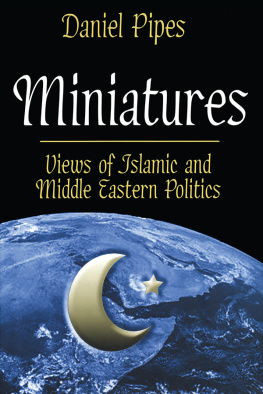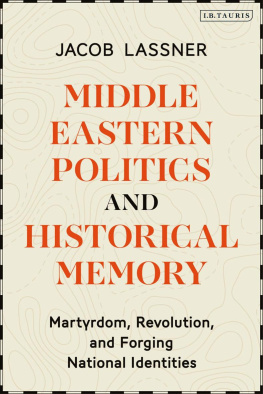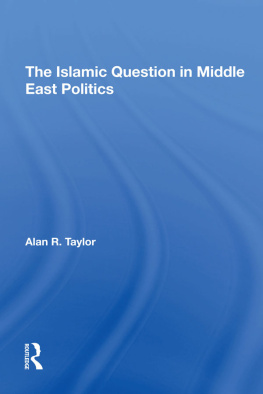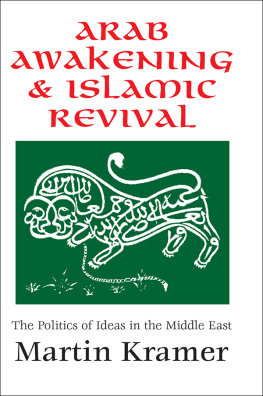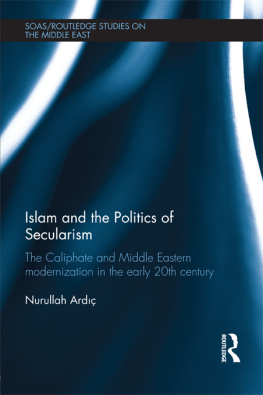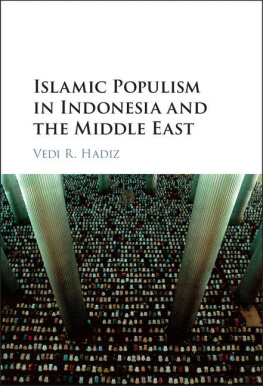First published 2004 by Transaction Publishers
Published 2017 by Routledge
2 Park Square, Milton Park, Abingdon, Oxon 0X14 4RN
711 Third Avenue, New York, NY 10017, USA
Routledge is an imprint of the Taylor & Francis Group, an informa business Copyright 2004 by Daniel Pipes.
Copyright 2004 by Daniel Pipes.
All rights reserved. No part of this book may be reprinted or reproduced or utilised in any form or by any electronic, mechanical, or other means, now known or hereafter invented, including photocopying and recording, or in any information storage or retrieval system, without permission in writing from the publishers.
Notice:
Product or corporate names may be trademarks or registered trademarks, and are used only for identification and explanation without intent to infringe.
Library of Congress Catalog Number: 2003065033
Library of Congress Cataloging-in-Publication Data
Pipes, Daniel, 1949
Miniatures : views of Islamic and Middle Eastern politics / Daniel Pipes, p. cm.
Includes bibliographical references (p.) and index.
ISBN 0-7658-0215-5 (alk. paper)
1. Islam and politicsMiddle East. 2. Middle EastPolitics and
government. I. Title: Views of Islamic and Middle Eastern politics,
II. Title.
BP173.7 .P565 2004
909.097670825dc22 2003065033
ISBN 13: 978-0-7658-0215-6 (hbk)
The German philosopher Georg W. F. Hegel wrote in 1837 about Muslim states: In its spread Mahometanism founded many king-doms and dynasties. On this boundless sea there is a continual on-ward movement, nothing abides firm. This emphasis on the vola-tility of Muslim politics is as true for the twenty-first century as it was in the seventh or the nineteenth. Indeed, at present, Hegels perception of continual onward movement has become pre-occupation of world politicsand at the central concern of the roughly hundred essays that follow.
These essays represent a crossover: I have a Ph.D. in the medieval history of Islam, yet much of my writing in recent years takes the shape of a weekly column that appears in newspapers and on websites. I endeavor to bring my specialized knowledge to a general audience via miniature research essays; thus the name of this volume.
This undertaking is made possible by the acute interest in the topics I cover; indeed, no single region of the world has quite dominated American and Western public discourse as does the Middle East today. This results mainly but not exclusively from the attacks of September 11 and the ensuing war on terrorism. Other prominent topics include militant Islam, Muslims in the West, the Arab-Israeli conflict, Iraq, Saudi Arabia, the price of oil and gas, and intra-Western debates over these issues.
Miniatures sections closely reflect those themes.
Part 1 covers the war on terror. I argue (in ) that terrors war against Americans began not with the destruction of the World Trade Center in 2001 but with the double assault on U.S. embassies in November 1979. Many of the pre-9/11 essays manifest my frus-tration that so few Westerners recognized the state of war that existed. Over this twenty-two-year period, from November 1979 to September 2001, my writings leveled four main criticisms at U.S. government policy: its insistence that militant Islamic attacks on Americans were criminal incidents, not war; its unwillingness to destroy the enemy forces; its ignoring the ideology of militant Islam that motivated these attacks; and its reluctance to make the policy changes required to win the war.
After 9/11 ( On the negative side, with a few exceptions, officials continued to ig-nore the militant Islamic ideology that motivates the attacks (war on terrorism). And while some policy changes did occur (for example, in the areas of immigration, airline security, and police sur-veillance of places of worship), I found these inadequate. Two out of four is not good enough; I worry that unless politicians summon the courage to make all the necessary changes, there will be a heavy price to pay.
The politically correct interpretation of the Muslim world by the U.S. government, leading media, and academic specialists holds that militant Islamic violence is a fringe form of Islamic extremism repudiated by the overwhelmingly moderate Muslim majority, or even that it has nothing to do with Islam at all (killers whose only faith is hate was how the president described those behind a series of murderous attacks in Riyadh in May 2003).
In , I report on developments in the Muslim world after 9/11joy at the death of thousands of Americans, wide Muslim support for bin Laden and dismay at the fall of the Taliban regime, a Taliban-like movement growing in Saudi Arabia, the spread of militant Islam to areas far beyond the Middle Eastby way of demonstrating that the establishment position offers political bromides, not serious analysis.
Shifting focus, part 2 looks at some general issues concerning Islam and Muslims. I begin (in ) with a basic point, that todays international crisis concerns not Islam the religion but mili-tant Islam the ideology. This argument has three happy implications:
This is not a religious war between Christendom and the umma (community of Muslims);
Moderate Muslims have a vital role in the fight against militant Islam; and
It is possible to devise policy goals to defeat and marginalize militant Islam.
I then focus on some details of militant Islam, noting the moral failings of Islamists, establishing the terrible reality of jihad, and noting the near-absence of religious freedom in the Middle East.
In addition to the traditional regions of Muslim habitation, Islam has, in the past four decades, developed a presence in the West. These immigrants, converts, and their descendents have vast implications for both sides, the Muslim and the Western (). I take up various questions about American Islamthe number of American Muslims, their division into moderates and militants, and the acute tensions between those two groups that come out most evidently when atheistic or even secular Muslims express themselves. Looking further away, I note some major developments in Australia and Denmark.
The growth of militant Islamic institutions in the United States and their bullying their way into the public square () is a particular concern of mine. The Islamists demand special consider-ation in everything from school textbooks to university commence-ment speeches to government-subsidized televisionand often they get it. These organizations do so well in large part because they succeed at presenting themselves as moderates, letting their true views come out only behind closed doors or by implication. I show some aspects of their real, extremist nature.
Part 3 looks at various political conflicts in the Middle East, espe-cially the Arab war against Israel. Chapters 7 and 8 look at the eras of Oslo Diplomacy (1993-2000) and Oslo War (2000-03). The reader can see the evolution of my writing, from a mild concern in the early years to an ever-increasing agitation that peaks in late 2000 and then, as the folly of the Oslo presumptions become more widely recognized, a return to relative calm.
Syria () has been a specialty of mine since 1985, with an emphasis on several themes: (1) how the sense of truncation gives Syrian politics a deep-seated expansionist edge; (2) how Westerners tend to reduce Syria to its relations with Israel, thereby missing the many other internal and external facets of that country; and (3) how Hafez al-Assad, ruler of Syria from 1970 until 2000, never intended to sign a peace treaty with Israel. I have devoted entire books to the first two subjects; here I provide interpretations over a seven-year period of Assads policy vis--vis Israel, followed by a couple of posthumous reviews. I can claim to be the only analyst who pre-dicted in January-March 2000 that Assad would not sign an agree-ment with Israel.


